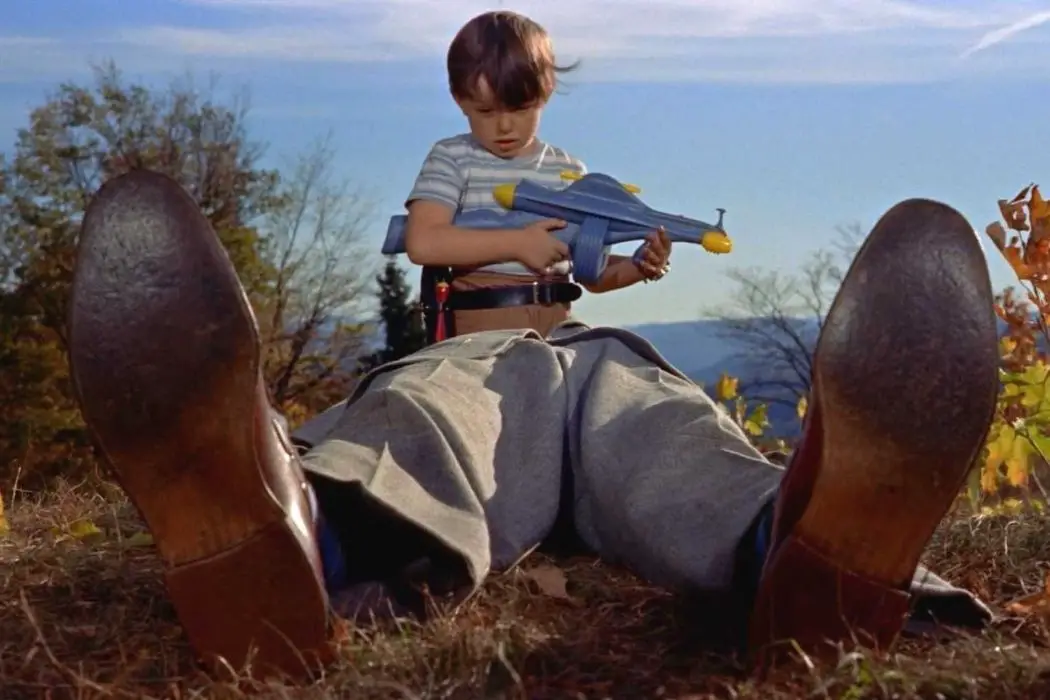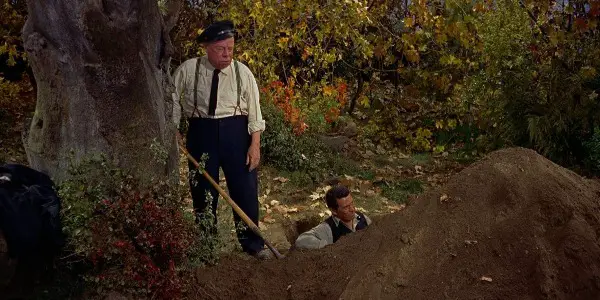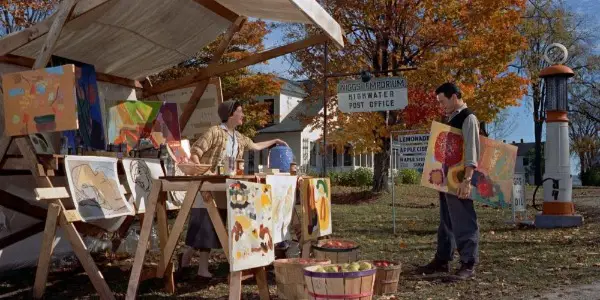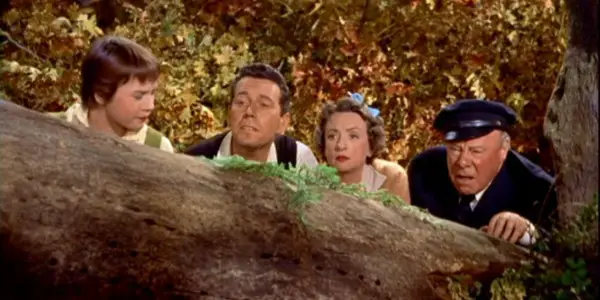THE TROUBLE WITH HARRY: Hitchc*ck’s Forgotten Masterpiece Of Subversive Sweetness

Film critic, Ithaca College and University of St Andrews graduate,…
Ask any casual cinemagoer what they know about Alfred Hitchc*ck and they’ll probably tell you about crazy motel clerks stabbing folks to death in showers, blondes set upon by birds, and other murders most macabre. But in 1955, Hitchc*ck’s new film was released worldwide — a comedy of all things: The Trouble With Harry. The film, a radical departure for the director, is one of his most forgotten, and it’s also one of his best, a night-black portrait of small-town New England nonchalance and charm.
For the uninitiated, the spider’s web of Hitchc*ck’s canon can be inexactly sliced down the middle and roughly hustled into two hemispheres: one for the lovers, one for the killers. These broad, broad sections always intersect in his films, but it’s always a matter of which foot the shoe’s on. Rebecca, for which he won Best Picture in 1940, remains about lovers first, killers a distant second. Vertigo, similarly, chronicles lovers, however unwilling, as does To Catch a Thief, which spends more of its runtime snuggling up to Cary Grant and Grace Kelly than it does participating in any kind of suspenseful French thievery.
But the legacy of Hitchc*ck is built by his suspense films and thrillers, including The 39 Steps, Saboteur, Strangers on a Train, North by Northwest and Rear Window, most of which require the wrong man to be in the wrong place at the wrong time. (One such film is literally named The Wrong Man.)
The wrong-man suspense film hinges on the discovery of a body, as does The Trouble With Harry, but whereas most of Hitchc*ck’s suspenseful work is all shadows and sordid affairs, Harry covers its central darkness with the warm and autumnal, finished with a chicory glacé. It’s a bitter tale told sweetly.
As for which camp the film belongs in, there’s no doubt it’s one for the lovers. Instead of whisking you away on an international tale of murder and intrigue, the film envelops you like a great big ugly, beautiful quilt your grandparents gave you. Ideally, one would watch it in mid-October beside a cracked-open window with a slice of pumpkin pie in hand. This is my comfort cinema.
Where The Trouble Begins
The mischief and whimsy begin with the titles, laid against a simplistic children’s sketch. The music by Bernard Herrmann opens with dark, augural horns before letting in levity, and a back-and-forth ensues between grim suspense and infantile play — the lighter sections of the theme recall the cartoony, tongue-firmly-in-cheek title music of Alfred Hitchc*ck Presents, which also premiered in 1955.
The corpse — that of Harry, played by Philip Truex — is found by a little boy (Jerry Mathers), who spends his afternoons running around the woods with a toy gun. So much of Harry looks backward to what came before it, and this little, lovable brat and his play pistol remind us of The 39 Steps, Saboteur and Strangers on a Train, in which alternately heroic or sinister characters ran amok packing loaded revolvers. But the only spying and war going on in the Vermont woods are within the boy’s imagination — this is a pristine, picturesque world, colored as though the local painter, Sam Marlowe (John Forsythe), brushed it into being. Murder has ostensibly no place here.

And yet death comes to Highwater, Vermont. The old, overweight Captain (Edmund Gwenn) soon stumbles across Harry, and believing he shot him by accident, goes about trying to clean up the mess. But there’s very little hustle. Harry’s dead, the Captain thinks, and so must be in no hurry to go anywhere. Naturally, the man sneaks in a nap or two before Sam comes along and, being a good neighbor, helps him bury the body.
But it seems bodies in Highwater don’t stay in the earth long. The rest of the film, at least as far as it concerns Harry, plays out like an extended Abbott and Costello skit, with poor dead Harry exhumed and buried again a good three or four times before anyone can decide what to do with him for good. But nobody’s terribly worried about it. Not the Captain, and certainly not his potential belle, Miss Gravely (Mildred Natwick).
A Distinct Lack of Conspiracy
Miss Gravely encounters him as he’s dragging Harry into the bushes — “What seems to be the trouble, Captain?” she politely inquires. The line is one of Hitchc*ck’s favorites, and the director’s fingerprints can be more readily found on this work than on many of his other, more genre-friendly outings. The Captain is one of his favorite leads, too — with Gwenn’s portly shape, charming grandfatherly grin, and tactful, honest speech, perhaps Hitchc*ck was finally seeing some of himself in his lead. This isn’t a 6-foot-tall suit spouting clever one-liners and pursuing the gorgeous blonde dame. This proud man sometimes stumbles over his words, can’t think of the right thing to say, and spends his days in idyllic laxity in the least eventful place on Earth. He’s content with his own mortality, and instead of lusting after a typical Hitchc*ck Blonde, he chases simple domestic fantasies of marrying Miss Gravely and munching on fresh blueberry muffins.
Gravely’s line also betrays something of the character of Highwater’s inhabitants — they all love a good crime, as though they read too many detective stories or are ardent listeners of My Favorite Murder. By the second or third time they exhume Harry, the Captain and Sam worry that they’ll let all the air out of their alibis and spoil the cover-up.
A single mother (Shirley MacLaine, in her first film role) gets drawn into the proceedings, too — her son discovered the body, and the body is also her absent husband… as far as murders go, it’s rather messy. Yet the dead body is the last thing on Harry’s mind. For all the morbidity of its premise, the film’s bright, full of Technicolor life and vibrant sun tones. At times, as when Sam begins to court MacLaine’s Jennifer Rogers, one forgets there’s a plot to all of this.
Even the lawman here, Deputy Sheriff Calvin Wiggs (Royal Dano) is treated like a joke. He’s a nuisance rather than a threat, and he and his snooping don’t so much loom over the story as they intermittently interrupt it. The murder’s a diaphanous shade covering a sensitive series of character studies and a message about American community.
There are no great cover-ups here, no secret conspiracies, no big-city scheming. Instead, all the characters are content to remain removed from urban life, away from busy society. I have no idea how many people Ms. Gravely has spoken to in the past three years she’s been neighbors with the Captain, but I’ll bet I can count them on two hands.
5th Avenue Is For The Little People
Once, Sam muses about bringing his paintings to 5th Avenue to hock. His salesman, Mrs. Wiggs (Mildred Dunnock), says they might sell better there, if there are more people. “Oh, lots of people,” Sam replies. “Hundreds and thousands and billions of people. But what sort of people, Wiggy? What breed? I’ll tell you — they’re little people. Little people with hats on.” No, Sam has all he needs in Highwater.

See, Sam fancies himself a great painter, but he hasn’t the success to show for it. All he has is passion for the work — he can’t even pay for a whole pack of cigarettes, instead scissoring a pack in twain and smoking stubs. “I’ll buy the other half tomorrow,” he tells Mrs. Wiggs. Hitchc*ck’s film isn’t about the murder because it’s really about interiority and the two selves: the self we truly are, and self we want ourselves to be.
Though he has none of it, Sam doesn’t really want success. If he did, he’d be trying to sell his paintings to whomever he can. Sam knows he’s a great painter — even if you think his work sucks, you have to at least praise him for being consistent with it — but what he lacks is appreciation. He’s clever, handsome, smart and generous, yet nobody around him seems to notice. He’s more interested in his success as a man, in terms of marrying someone beautiful, being fulfilled, having a purpose, than he is in his success as an artist.
Similarly, Miss Gravely spends the film trying to live up to her birth certificate. She believes she’s maintained her vibrant, youthful energy and has a rich family background sure to intrigue any gentleman callers. But that’s all a ruse too — she’s clearly older than she lets on, she’s unwilling to let anyone in emotionally, and she barely has any history to speak of.
As for the Captain, he tells everyone of his exploits in some war somewhere, though his colorful, dramatic stories don’t always add up. But he thinks he’s brave and heroic and wants the town to regard him as such, as the veteran of a long-ago-won war who can sit back and relax on the coattails of his military success. In reality, he’s just a tugboat captain who never made it past the East River.
And Jennifer desperately wants to be a free woman. When Harry dies, she’s elated; this is what she’d been clamoring for for years — her freedom from marriage. But of course, she isn’t out of the woods yet. She’s got a kid to raise, income to earn, and a dead husband gnawing away at her.
Love, Happy Endings, and Grave-Digging
So the stage is set for a classic comedic ending — surely everyone will pair off in the end, kiss and be merry. But the trick to their happiness isn’t that they wind up with people who believe their lies, but rather, everyone gets someone who sees them the way they want to be seen. After Sam haggles a litany of gifts out of a millionaire, he wins the adoration and respect of not only Jennifer, but Miss Gravely and the Captain as well. In return, he respects Jennifer’s independence and insists that they’ll be the only free married couple on Earth (they get married).
The Captain adores Miss Gravely and says she’s stunningly young-looking. He also calls her “well-preserved,” which is rough until you consider the rural Vermont setting and how much goddamn jam these people must be eating. Surely every year, each character eats their weight in jam three times over. With this in mind, the Captain’s calling Miss Gravely “well-preserved” sounds less like the shocking courtroom admission of a necrophile and more like the sweet, quintessentially Vermontian musings of a sweet old man who’s probably got only a teensy bit of a dirty mind. As for the Captain, when he reveals his lie to Ms. Gravely, she says, “You were the handsomest tugboat captain who ever sailed up the East River.”
Each of us only wants to be recognized as the people we want to be but maybe aren’t yet. The characters in Harry are in flux, being pushed toward uncertain fates, caught up in that perennial struggle of trying to be a better person. After all, what better season is there for undergoing change than autumn?

At the end of the day, despite Harry’s death and a good deal of grave-digging, when the millionaire returns, Sam’s generous asking price manages to help out each of the five. Fresh monthly strawberries for Jennifer, a smelly chemical set for the kid, a new cash register for Mrs. Wiggs, a hope chest for Miss Gravely, hunting getup for the Captain, and a queen bed for Sam to share with Jennifer. It’s not monetary gain that improves the lives of the characters; it’s the little things, like hope and strawberries. What happened to Harry is by this point a distant memory; we’ve just seen four perfectly rendered characters discover the true source of happiness. (And I suppose Mrs. Wiggs got a cash register, so they all win, don’t they?)
Pour The Lemonade
Perhaps the scene that best captures the subversive sweetness of The Trouble with Harry comes early, when Sam meets Jennifer for the first time. He wants to confront her about the dead man in the hills slumped up against some bushes, but she’s so beautiful that he forgets what he came to ask her. Instead, he chats with her kid, gives him a pet frog (lord knows where that came from), and he and Jennifer share lemonade on the porch, chatting about bygone romance and lingerie.
This is why I love The Chilling Adventures of Sabrina so much. (That’s also a show tailormade for autumn.) That show knows that sometimes the world can be inexplicably evil and incomprehensibly vile. The Trouble With Harry was regarded upon its release as a black comedy, accused of gallows humor. There’s darkness and evil in the mix — its comedy is built on the corpse of a man who did nothing wrong, after all — but there’s enough beauty over top to reassure us.
No movie understands this better than Fargo, specifically, that film’s ending, with Marge Gunderson (Frances McDormand) lying in bed next to her husband — the world is often cruel, unforgiving. Sometimes it punishes the good and rewards the wicked. Sometimes strangers kidnap a woman and kill seven people, all for a little bit of money. Sometimes, in the case of Sabrina, we accidentally reanimate our boyfriend’s dead brother and turn him into a ravenous zombie. Sometimes a man walks into the yellows and reds of the New England woods and just dies.
But as dark as the world gets for these shows and movies, they share a common belief in the redemptive power of a cup of coffee, a tall stack of pancakes, and the morning newspaper and the absolute goodness of honesty, lemonade and being a good neighbor. These won’t set the world right again — nobody can bring Harry back to life — but these little scraps of small-town Americana are often just enough to pull us through the bad times.
What’s your autumn comfort movie or show? Does it also involve murder like The Trouble with Harry? Let me know in the comments below — if only so I can add it to my watchlist!
Watch The Trouble with Harry
Does content like this matter to you?
Become a Member and support film journalism. Unlock access to all of Film Inquiry`s great articles. Join a community of like-minded readers who are passionate about cinema - get access to our private members Network, give back to independent filmmakers, and more.
Film critic, Ithaca College and University of St Andrews graduate, head of the "Paddington 2" fan club.












